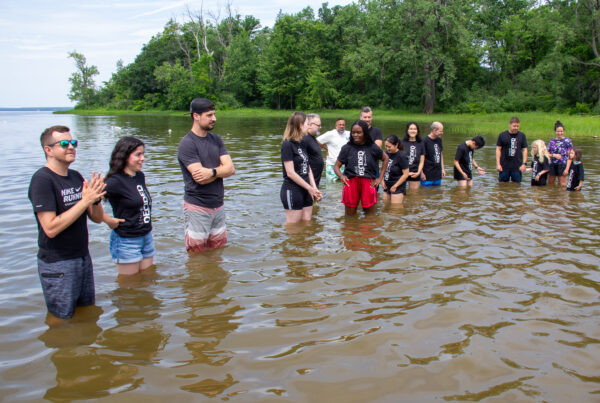This post is the second in a four part series for aspiring church planters. For the other posts in this series use the buttons at the bottom of this page.
And let them also be tested first; then let them serve as deacons if they prove themselves blameless. 1 Timothy 3:10
We live in a culture that wants to say “yes” to everyone. We want people to reach their full potential. In this context it becomes very hard to say “no” to someone who shows great enthusiasm and conviction to undertake a task. To critique and question someone today is seen in a very negative light and is often perceived to be restricting one’s personal freedom. In the church we are just as susceptible to this way of thinking, and can be easily fooled by those who feel that they should be involved in church leadership simply because they are enthusiastic and full of conviction.
Gifts never improve our standing before Jesus, but they do qualify us for specific roles within the church
Enthusiasm and conviction are not wrong. But those that have been given the task of church leadership and church planting can carry out that job only because God has first gifted them for this task. Scripture affirms that God gifts the body of Christ accordingly for the advancement of his kingdom [Ephesians 4 and Hebrews 13]. Each person in the Church has been given a gift or gifts for this end. They’re not all the same; some people possess the gifts others do not, which is why we need each other so much. These gifts will never improve our standing before Jesus or qualify us for his love, but they do qualify us for specific and focused roles within the life of the local church.
For any aspiring church planter, the place to start in discerning a desire to plant is therefore to test the gifts. In order for a ‘longing’ to plant a church to grow into a reality, desire must correlate with the gifts God has given you.
So how we can begin to test these giftings and competencies? We can begin by asking two very simple questions of ourselves;
-
Do I know myself?
Do I know what I like, what I am good at and where I excel? Do I know when and where I struggle? Do I know my own limitations?
-
Do others know me?
Are there people in my life who are honest with me, who would give me honest critique? Would people say no to me?
If the answer is ‘no’ to any of the above questions we have two problems. First, by not knowing ourselves or being known by others, we have taken away the possibility of an honest ‘no’ to our desire for planting a church. Second, the weight of the ‘yes’ for church planting is lost — we can have no real confidence that we are equipped for this task.
We need to create a space, an environment where testing can take place, and this happens when you have the capabilities and attitude to be real & honest with yourself and have others that will be real and honest with you. Once this space is established we can begin to assess ourselves against the core giftings of a church planter.
1. Theological Clarity
Acts 29 is convicted that church planting is first and foremost a theological endeavour and, as such, a planter must possess certain gifts with regards to Scripture and his ability to bring it to bear on people’s lives.
Here are some questions to ask of yourself:
- Can you competently handle Scripture?
- Are you immersed in the core doctrines of the faith and how they apply to the lives and hearts of the body of Christ?
- Are you able to point out Christ from page to page of Scripture?
- Can you rightly divide the Word of God over people’s lives?
- Can you bring the gospel to bear on people’s lives so that they are transformed?
- Are you able to explain the Bible in a clear, compelling, Christ-like manner, which results in people being encouraged, edified and equipped for ministry?
- When you teach, are you able to passionately and emotionally connect people to the text?
Practical Tip: Get serious about theological training, either residential or distance learning. Get as much practice to teach as you can. Ask and look out for opportunities within and outside your church to teach: student ministry? Retirement centres? Prison ministries? Take someone with you who will be able to give you honest and constructive feedback.
2. Leadership
Aspiring church planter, your ability to tend to and lead God’s flock will be central to the health of a church plant.
As someone contemplating being an under-shepherd of God’s people, your ability to tend to and lead his flock will be essential and central to the health of a church plant.
Some questions:
- Do people confidently and joyfully follow you?
- Do people call upon you for wise counsel?
- Do people rely on you?
- Will people follow the pattern of your lifestyle?
- Can you gather and develop people?
Practical Tips: Get as much experience in leading as possible in whatever context and whatever level. Understand how you relate to others and how they relate to you beyond the binary introvert / extrovert spectrum. Consider personality-profiling tests to get a deeper understanding of your personal leadership qualities.
3. Ability to make disciples
Making disciples is the work of both maturing those who are in the faith and bringing others to faith.
Making disciples is the work of both maturing those who are in the faith and bringing others to faith. It is missional through and through.
Some questions:
- Can you walk people from unbelief into maturity in Christ?
- Can you engage people in their doubt and hatred and walk them into submission and obedience?
- Can you persevere and be patient with those who are prone to wander?
- How does your lifestyle lend itself to engaging with non-Christians?
- Are you committed to living a missional lifestyle?
- With whom have you shared the gospel in the last 6 months / year?
Practical Tips: Identify your deficiencies and why this might be the case. Not living in community? Fear of man? Lack of love? Go out of your way to seek out opportunities to disciple someone. Ask your church leadership / eldership for opportunities to do this, if you aren’t already.
Discerning the will of God – his good and perfect will – in your desire to plant a church involves the humble and honest testing of these indispensable competencies. Many of these can be developed over time, meaning you will want to see an upward, progressive trajectory rather than complete mastery. Take time to try and test these areas over a longer season; try out different ministries, seek external affirmation from several sources and, above all, do it in the context of a relational community.
If you are under 25, take the Acts 29 pre-assessment and have your pastor ask for the results.
If you are over 25 and are 12-18 months from planting, take the Preparing to Plant Assessment track.
If you are over 25 and already 2 years or more in to your plant take the Existing Church Assessment track.











